2014最新人教版八年级英语下册各单元语法点汇总
人教版八年级(下)英语必考的十二大语法点汇总

人教版八年级(下)英语必考的十二大语法点汇总(一)形容词/副词的比较级和最高级1. 形容词/副词的比较级和最高级的构成规则(1)单音节词和少数以-er,-ow结尾的双音节单词,比较级在后面加-er,最高级在后面加-est。
①单音节单词small→smaller→smallest short→shorter→shortesttall→taller→tallest great→greater→greatest②少数以-er,-ow结尾的双音节单词clever→cleverer→cleverest narrow→narrower→narrowest(2)以不发音e结尾的单音节单词,比较级在原形后加-r,最高级在原级后加-st。
large→larger→largest nice→nicer→nicest able→abler→ablest(3)以一个辅音字母结尾的闭音节(即:辅音+元音+辅音)单词中,先双写末尾的辅音字母,比较级加-er,最高级加-est。
big→bigger→biggest hot→hotter→hottest fat→fatter→fattest(4)以“辅音字母+y”结尾的双音节词,把y改为i,比较级加-er,最高级加-est。
easy→easier→easiest heavy→heavier→heaviestbusy→busier→busiest happy→happier→happiest(5)其他双音节词和多音节词,比较级在前面加more,最高级在前面加most。
beautiful→more beautiful→most beautifuldifferent→more different→most differenteasily→more easily→most easily(6)有少数形容词、副词的比较级和最高级是不规则的,必须熟记。
good→better→best well→better→bestbad→worse→worst ill→worse→worstold→older/elder→oldest/eldestmany/much→more→most little→less→leastfar →further/farther→furthest/farthest2. 形容词和副词比较级的用法(1)“甲+be+(倍数)+形容词比较级+than+乙”表示“甲比乙…”或“甲比乙…几倍”。
人教版八年级下册英语Unit 9单元语法知识点总结

人教版八年级下册英语Unit 9单元语法知识点总结本单元重点短语的具体用法1. at night:在夜晚。
例如:I usually go to bed at night.(我通常在夜晚睡觉。
)2. in a more natural environment:在一个更加自然的环境中。
例如:We can enjoy the beauty of nature in a more natural environment.(我们可以在一个更加自然的环境中欣赏大自然的美丽。
)3. all year round:一年到头;终年。
例如:The flowers bloom all year round in this garden.(这个花园里的花一年到头都开放。
)4. be far from:离……远。
例如:The school is far from my home.(学校离我家很远。
)5. in the dark:在黑暗中。
例如:I can't see anything in the dark.(我在黑暗中什么也看不见。
)6. in the past:在过去。
例如:Life was very different in the past.(过去的生活非常不同。
)7. have been to sp.:去过某地。
例如:I have been to Beijing many times.(我去过北京很多次。
)8. science museum:科学博物馆。
例如:We visited the science museum last weekend.(我们上周末参观了科学博物馆。
)9. history museum:历史博物馆。
例如:The history museum has many interesting exhibits.(历史博物馆有很多有趣的展品。
)10. amusement park:游乐园。
例如:We had a great time at the amusement park.(我们在游乐园玩得很开心。
人教版八年级下册英语Unit 10单元语法知识点总结

人教版八年级下册英语Unit 10单元语法知识点总结本单元重点短语的具体用法1. "These days":表示目前或现在的情况。
例如:These days, more and more people are using mobile phones.(现在,越来越多的人使用手机。
)2. "Regard with great interest":表示以极大的兴趣关注着。
例如:I always regard with great interest the development of technology.(我总是以极大的兴趣关注着技术的发展。
)3. "In order to":表示目的。
例如:She studies hard in order to get good grades.(她努力学习是为了取得好成绩。
)4. "So far":迄今为止,到现在为止。
例如:So far, we have learneda lot of new knowledge.(到目前为止,我们已经学到了很多新知识。
)5. "In need":需要。
例如:We should help those in need.(我们应该帮助那些需要帮助的人。
)6. "Not...anymore":不再......例如:He doesn't play basketball anymore.(他不再打篮球了。
)7. "Welcome to sp.":欢迎来到......例如:Welcome to our school.(欢迎来到我们学校。
)8. "Check out":察看、观察。
例如:Let's check out the new restaurant.(我们去看看那家新餐厅吧。
(完整版)人教版英语八年级下册重点词组、句型及语法点汇总,推荐文档
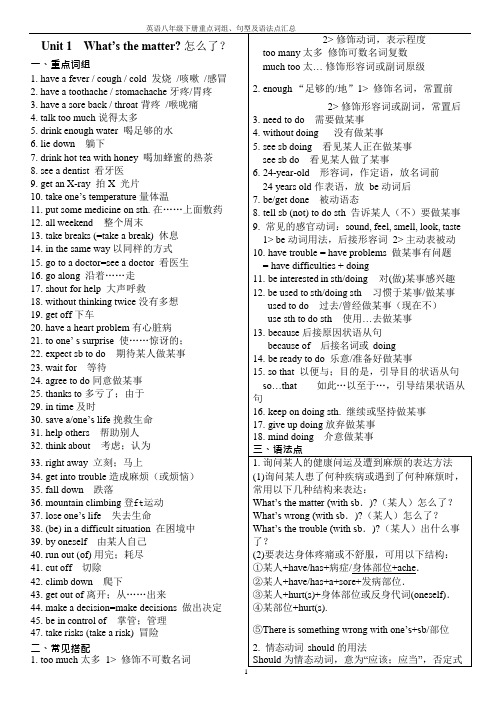
13.be back 回来14.be angry with sb 生某人的气15.throw down 扔下16.the minute=as soon as 一…就…e over 过来18.sit down 坐下19.take sb. for a walk 带某人去散步20.all the time 频繁;反复21.all day / evening 整日/夜22.shout back 大声回应23.walk away 走开24.in surprise 惊讶地25.share the housework 分担家务26.hang out 闲逛27.do chores 做杂务28.go to the store 去商店29.buy drinks and snacks 买饮料和点心30.make sb. do sth. 使某人做某事31.have enough stress from 有来自…足够的压力32.a waste of time 浪费时间33.in order to 为了34.get good grades 取得好成绩35.depend on 依赖;依靠36.have no idea 不知道37.develop children’s independence 发展孩子独立性38.look after=take care of 照顾;照看39.as a result 结果40.agree with sb 同意某人的观点/意见disagree with sb 不同意某人的观点/意见二、常见搭配1.finish doing sth. 完成做某事2.a few “几个”,后接可数名词复数few “很少,几乎没有”,后接可数名词复数a little “一点儿”,后接不可数名词little “很少,几乎没有”,后接不可数名词3.1> question “问题”,需要回答的问题,与ask或answer 搭配2> problem “问题”,需要解决的问题,与solve 搭配in the front of “在…前面”,在所说范围之内5.as…as… “与…一样…”,中间加形容词或副词原级,。
人教版八年级英语下册各单元知识点总结完整版

Unit 1 What’s the matter?一、重点短语1. have a fever 发烧2. have a cough 咳嗽3. have a toothache 牙疼4. talk too much 说得太多5. drink enough water 喝足够的水6. have a cold 受凉;感冒7. have a stomachache 胃疼8. have a sore back 背疼9. have a sore throat 喉咙痛10. lie down and rest躺下来休息11. hot tea with honey加蜂蜜的热茶12. see a dentist看牙医13. get an X-ray拍X光片14. take one’ s temperature量体温15. put some medicine on sth在……上面敷药16. feel very hot 感到很热17. sound like 听起来像18. all weekend 整个周末19. in the same way以同样的方式20. go to a doctor 看医生21. go along 沿着……走22. on the side of the road 在马路边23. shout for help 大声呼救24. without thinking twice 没有多想25. get off 下车26. have a heart problem 有心脏病27. to one’ s surprise 使……惊讶的28. thanks to 多亏了;由于29. in time及时30. save a life 挽救生命31. get into trouble 造成麻烦32. right away 立刻;马上33. because of 由于34. get out of 离开35. hurt oneself 受伤36. put a bandage on sth. 用绷带包扎37. fall down 摔倒38. feel sick 感到恶心39. have a nosebleed 流鼻血40. cut his knee割伤他的膝盖41. put her head back 把她的头向后仰42.have problems breathing呼吸困难43. mountain climbing登山运动44. be used to doing sth. 习惯做某事45. run out (of) 用完;用尽46. so that 以便47. so…that 如此……以至于……48. be in control of 掌管;管理49. in a difficult situation 在逆境屮50. keep on doing sth.坚持做某事51. make a decision做出决定52. take risks 冒险53. give up 放弃二、知识点解析1. What’s the matter? 怎么了?若是询问“某人怎么了?”要用“What’s the matter with sb.?”拓展:What’s the matter with sb.? 的同义句:What’s wrong with sb.? / What’s the trouble with sb.?2.疾病类短语:have a +疾病. e.g. :have a fever 发烧have a cold 感冒have a cough 咳嗽.have a +身体部位-ache. e.g.: have a headache 头痛have a toothache 牙痛.have a sore+身体部位. e.g.: have a sore throat咽喉痛have a sore back背痛例题:Mom, I____________.I’m sorry to hear that, dear. We must go to see the dentist right away.A. have a headacheB. have a stomachacheC. have a toothacheD. have a fever3. lie down 躺下V. 躺,平躺。
八年级下册英语各单元重点短语+句型语法 人教版

八年级下册英语各单元重点短语+句型语法人教版1. Unit 1Important phrases:- get to know: I want to get to know my new classmates.- make friends with: I hope to make friends with some local students.- be interested in: She is interested in learning a new language.- take part in: Are you going to take part in the school talent show?- show off: Don't show off in front of your friends.- be proud of: I am proud of my brother for winning the race.Sentence patterns and grammar:- Present continuous tense: He is playing football in the park.- Comparative adjectives: My sister is taller than me.- Superlative adjectives: This is the best pizza I've ever tasted.2. Unit 2Important phrases:- turn off: Don't forget to turn off the lights before you leave.- set off: We will set off for the beach early in the morning.- look forward to: I am looking forward to the schooltrip next week.- get along with: I get along with my classmates very well.- break down: Our car broke down on the way to the airport.- run out of: We ran out of milk, so I need to go to the store.Sentence patterns and grammar:- Past continuous tense: They were playing basketball when the rain started.- Modal verbs: You should study harder for the exam.- Reported speech: She said that she was going to the movies.3. Unit 3Important phrases:- be strict with: My teacher is very strict with homework deadlines.- get into: She wants to get into a good university.- take care of: Don't forget to take care of your little brother.- be good at: I am good at playing the piano.- look up to: I look up to my older sister as a role model.- come up with: We need to come up with a plan for the project.Sentence patterns and grammar:- Future perfect tense: By next year, I will havefinished high school.- Present perfect continuous tense: She has been studying English for five years.- Conditional sentences: If I had known, I would have helped you.4. Unit 4Important phrases:- call for: This situation calls for a serious discussion.- hold on: Please hold on while I transfer your call.- look out: Look out for the car coming down the road.- put off: Don't put off until tomorrow what you can do today.- try out: I want to try out for the school basketball team.- fall apart: Our friendship fell apart after the argument.Sentence patterns and grammar:- Present perfect tense: I have finished my homework.- Past perfect tense: She had already left when I arrived.- Passive voice: The cake was made by my mom.5. Unit 5Important phrases:- set up: We need to set up the equipment for the presentation.- take off: The plane will take off in an hour.- go through: I will go through my notes before the exam.- look into: The police will look into the matter.- pick up: Can you pick up some milk on your way home?- be satisfied with: I am satisfied with my test results.Sentence patterns and grammar:- Future continuous tense: They will be having dinner at7 PM.- Reported questions: He asked her where she was goingfor the holidays.- Relative clauses: The boy who won the race is my friend.6. Unit 6Important phrases:- be proud of: She is proud of her achievements.- look after: My sister looks after our pet dog.- give up: Don't give up on your dreams.- make a decision: I need to make a decision about which college to attend.- put up with: I can't put up with his behavior any longer.- take after: My son takes after his father in terms of looks.Sentence patterns and grammar:- Past perfect continuous tense: She had been studying all night when her parents arrived.- Reported commands: He told her to clean her room.- Adverb clauses: I will call you when I get home.。
人教版八年级下册英语Unit 4单元语法知识点总结

人教版八年级下册英语Unit 4单元语法知识点总结本单元重点短语的具体用法1. have free time:表示有空闲时间。
例如:I hope to have free time to read books.(我希望有空闲时间读书。
)2. allow sb. to do sth.:允许某人做某事。
例如:My parents allow me to play basketball on weekends.(我父母允许我在周末打篮球。
)3. hang out with sb.:与某人闲逛。
例如:I like to hang out with my friends on Sundays.(我喜欢在周日和我的朋友们闲逛。
)4. after-school classes:课外活动课。
例如:She takes many after-school classes to improve her skills.(她参加很多课外活动课来提高她的技能。
)5. get into a fight with sb.:与某人吵架/打架。
例如:He got into a fight with his classmate yesterday.(他昨天和他的同学吵架了。
)6. until midnight:直到半夜。
例如:She often stays up until midnight to finish her homework.(她经常熬夜到半夜完成作业。
)7. talk to sb.:与某人交谈。
例如:The teacher talked to me about my study.(老师和我谈论了我的学习。
)8. too many:太多,修饰可数名词。
例如:There are too many books on the desk.(桌子上有太多书了。
)9. study too much:学得过多。
例如:He studies too much and needs to relax.(他学得太多了,需要放松一下。
人教版八年级下册英语期末复习:各单元重要语法知识点总结(实用!)

人教版八年级下册英语期末复习: 各单元重要语法知识点总结Unit 11.th.+ad.表示一类人, th.+姓氏复数形式, 表示夫妇两人或一家人, 谓语动词用复数2.hav.difficulty/troubl./problem.i.doin.st.“做某事有困难”,doing前的in可以省略。
3.动词不定式用法①动词不定式作宾语。
v+ to do sth 常见的动词有: want, decide, hope, plan,would like ,等, 表示还没有做的动作。
②动调不定式作状语。
表示行为、目的、结果。
句子+to do sth 或To do sth , + 句子③动词不定式作宾语补足语。
v+s..t.d.sth.常用动词有: as..wan..tell.wis.H.tol.me(mot).today、他叫我今天④表示感觉的动词, 如see,hear,notice,feel 等, 以及使役动词let, have,make等后常用省略to的动词作宾语补足语。
l see him leave.我看见他离开了。
⑤做主语。
做主语时常和It’s+ adj + for + sb + to do sth 转换, it's是形式主语, 动词不定式是真实主语⑥做定语。
a house to live in 住的房间paper to write on 写的纸。
此时的动词不定式与所修饰的名词构成动宾或逻辑关系。
4.happen的用法①sth.happene.t.s.某人出了某事(常指不好的事. eg:Wha.happene.t.you?你怎么啦?②sb.happen(s)to do sth.某人碰巧做某事eg: I happened to meet a friend of mine in the street yesterday.③辨析happen / take place happen是突然发生, 偶然发生的事, take place是按计划, 安排发生的事。
新人教版八年级下册英语语法知识点总结
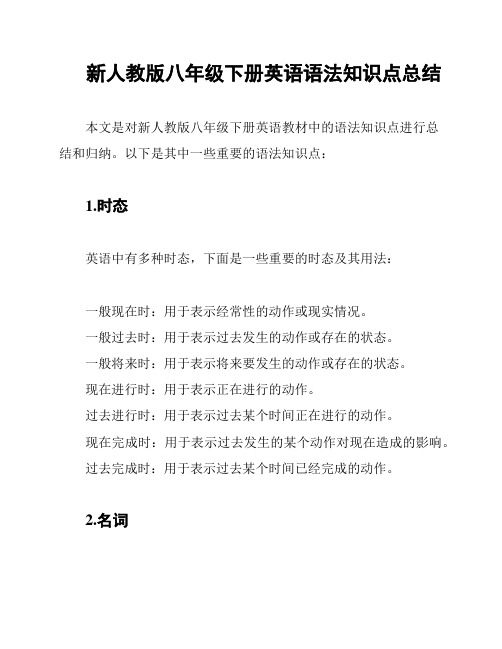
新人教版八年级下册英语语法知识点总结本文是对新人教版八年级下册英语教材中的语法知识点进行总结和归纳。
以下是其中一些重要的语法知识点:1.时态英语中有多种时态,下面是一些重要的时态及其用法:一般现在时:用于表示经常性的动作或现实情况。
一般过去时:用于表示过去发生的动作或存在的状态。
一般将来时:用于表示将来要发生的动作或存在的状态。
现在进行时:用于表示正在进行的动作。
过去进行时:用于表示过去某个时间正在进行的动作。
现在完成时:用于表示过去发生的某个动作对现在造成的影响。
过去完成时:用于表示过去某个时间已经完成的动作。
2.名词名词是指表示人、事物、地方、概念等具体或抽象事物的词语。
在句子中,名词可以作为主语、宾语、表语等。
一些常见的名词类型有:可数名词:表示可以用数目来计算的名词,可以有单数和复数形式。
不可数名词:表示无法以数目计算的名词,只有单数形式。
可数名词与不可数名词的区分。
3.代词代词是用来代替名词的词语。
根据指代的对象不同,代词可以分为人称代词、物主代词、指示代词、疑问代词等。
常见的代词有:人称代词:I。
you。
he。
she。
it。
we。
they。
物主代词:my。
your。
his。
her。
its。
our。
their。
指示代词:this。
that。
these。
those。
疑问代词:who。
whom。
whose。
what。
which。
4.形容词和副词形容词用来描述名词的性质或特征,副词用来修饰动词、形容词或其他副词。
常见的形容词和副词有:形容词:big。
small。
tall。
short。
happy。
sad等。
副词:slowly。
quickly。
carefully。
loudly。
well等。
5.介词介词用于表示名词、代词与其他词之间的关系,常常表示时间、地点、方向、原因等。
常见的介词有:in。
on。
at。
from。
to。
with。
without等。
以上是新人教版八年级下册英语语法知识的部分总结。
在学习英语的过程中,掌握这些语法知识可以帮助我们更好地理解和运用英语语言。
人教版八年级下册英语 Unit 1-Unit 10 各单元语法知识点复习提纲(全面!)

人教版八年级下册英语Unit 1-Unit 10 各单元语法知识点复习提纲Unit 1重点短语be in control of 掌管;管理because of 由于fall down 摔倒feel sick 感到恶心get an X-ray 拍X 光片get into trouble 造成麻烦get off 下车get out of 离开;从……出来give up 放弃go along 沿着……走go to a doctor 看医生have a cold 受凉;感冒have a cough 咳嗽have a fever 发烧have a heart problem 有心脏病have a nosebleed 流鼻血have a sore back 背疼have a sore throat 喉咙痛have a stomachache 胃疼have a toothache 牙疼have problems breathing 呼吸困难hot tea with honey 加蜂蜜的热茶in a difficult situation 在闲境中in the same way 以同样的方式in time 及时keep on doing sth. 继续或坚持做某事make a decision 做出决定on the side of the road 在马路边right away 立刻;马上run out (of) 用完;用尽see a dentist 看牙医shout for help 大声呼救so that 以便so...that... 如此……以至于……sound like 听起来像take one's temperature 量体温take risks 冒险talk too much 说得太多thanks to 多亏了;由于to one's surprise 另某人惊讶的是without thinking twice 没有多想词法精选1.I have a stomachache.我胃痛。
人教版八年级下册英语知识点总结
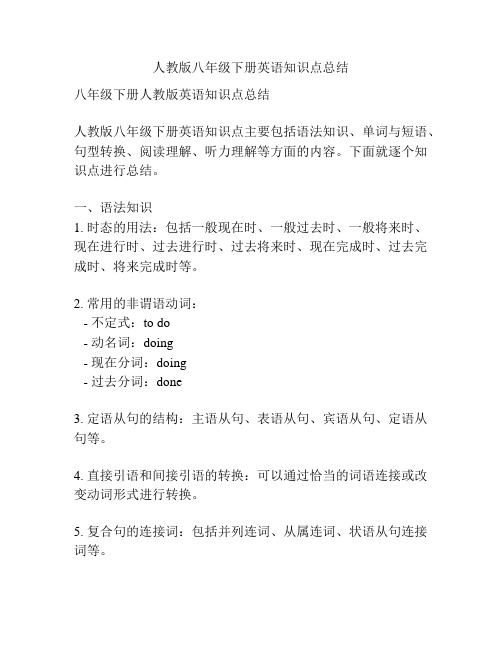
人教版八年级下册英语知识点总结八年级下册人教版英语知识点总结人教版八年级下册英语知识点主要包括语法知识、单词与短语、句型转换、阅读理解、听力理解等方面的内容。
下面就逐个知识点进行总结。
一、语法知识1. 时态的用法:包括一般现在时、一般过去时、一般将来时、现在进行时、过去进行时、过去将来时、现在完成时、过去完成时、将来完成时等。
2. 常用的非谓语动词:- 不定式:to do- 动名词:doing- 现在分词:doing- 过去分词:done3. 定语从句的结构:主语从句、表语从句、宾语从句、定语从句等。
4. 直接引语和间接引语的转换:可以通过恰当的词语连接或改变动词形式进行转换。
5. 复合句的连接词:包括并列连词、从属连词、状语从句连接词等。
二、单词与短语1. 数词与序数词:如one, two, three等,以及first, second, third 等。
2. 表示时间的词汇:如时钟时间(o'clock), 小时(hour), 分钟(minute), 星期(week), 日期(date), 月份(month)等。
3. 学科与科目:包括数学(maths),物理(physics),化学(chemistry),历史(history),地理(geography)等。
4. 动物:如狗(dog),猫(cat),鸟(bird),鱼(fish),狼(wolf)等。
5. 天气与季节:如晴天(sunny),雨天(rainy),多云(cloudy),下雪(snowy),春天(spring),夏天(summer),秋天(autumn),冬天(winter)等。
三、句型转换1. 一般疑问句与肯定句:通过改变句序或加上助动词进行转换。
2. 否定句与肯定句:通过在动词前加上not或助动词即可。
3. 特殊疑问句与句子:通过疑问词来引导句子。
四、阅读理解1. 短文填空:根据短文内容和上下文的逻辑关系填写合适的单词。
2. 选择题:根据短文内容选择最佳答案。
2014最新人教版八年级英语下册各单元语法点汇总

Unit 1 What’s the matter?一、询问某人的健康问运及遭到麻烦的表达方法(1)询问某人患了何种疾病或遇到了何种麻烦时,常用以下几种结构来表达:What’s the matter (with sb.)?(某人)怎么了?What’s wrong (with sb.)?(某人)怎么了?What’s the trouble (with sb.)?(某人)出什么事了?What happened (to sb.)?(某人)发生了什么事?Are you OK?你没事吧?Is there anything wrong with sb.?某人有什么事吗?(2)要表达身体疼痛或不舒服,可用以下结构:①某人+have/has+病症.The twins have colds.双胞胎感冒了。
某人+have/has+a+headache/toothache/stomachache/backache/earache.She had a stomachache last night.她昨晚肚子痛。
③某人+have/has+a+sore+发病部位. He has a sore throat.他喉咙痛。
④某人+hurt(s)+身体部位或反身代词. He hurt his leg.他的腿受伤了。
⑤某部位+hurt(s).My head hurts badly.我头痛得厉害。
⑥某人+have/has+a pain+in one’s+身体部位, I have a pain in my chest.我胸口痛。
⑦(There is)something wrong with one’s+身体部位.There is something wrong with my right eye..我的右眼有毛病。
⑧其他表达方式She has a heart trouble.她有心脏病。
He got hit on the head他头部受到了撞击。
人教版八年级下册英语Unit 5单元语法知识点总结
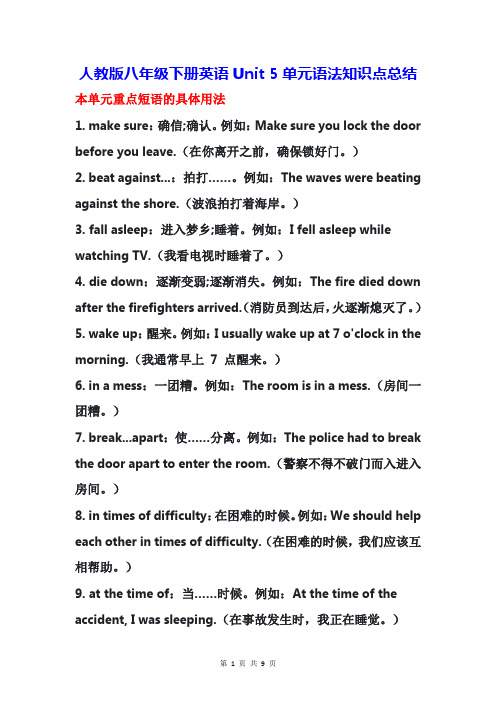
人教版八年级下册英语Unit 5单元语法知识点总结本单元重点短语的具体用法1. make sure:确信;确认。
例如:Make sure you lock the door before you leave.(在你离开之前,确保锁好门。
)2. beat against...:拍打……。
例如:The waves were beating against the shore.(波浪拍打着海岸。
)3. fall asleep:进入梦乡;睡着。
例如:I fell asleep while watching TV.(我看电视时睡着了。
)4. die down:逐渐变弱;逐渐消失。
例如:The fire died down after the firefighters arrived.(消防员到达后,火逐渐熄灭了。
)5. wake up:醒来。
例如:I usually wake up at 7 o'clock in the morning.(我通常早上7 点醒来。
)6. in a mess:一团糟。
例如:The room is in a mess.(房间一团糟。
)7. break...apart:使……分离。
例如:The police had to break the door apart to enter the room.(警察不得不破门而入进入房间。
)8. in times of difficulty:在困难的时候。
例如:We should help each other in times of difficulty.(在困难的时候,我们应该互相帮助。
)9. at the time of:当……时候。
例如:At the time of the accident, I was sleeping.(在事故发生时,我正在睡觉。
)10. go off:(闹钟)发出响声。
例如:The alarm went off at 6 o'clock.(闹钟在6 点钟响了。
人教版初中英语八年级下册全册各单元知识点、语法归纳整理
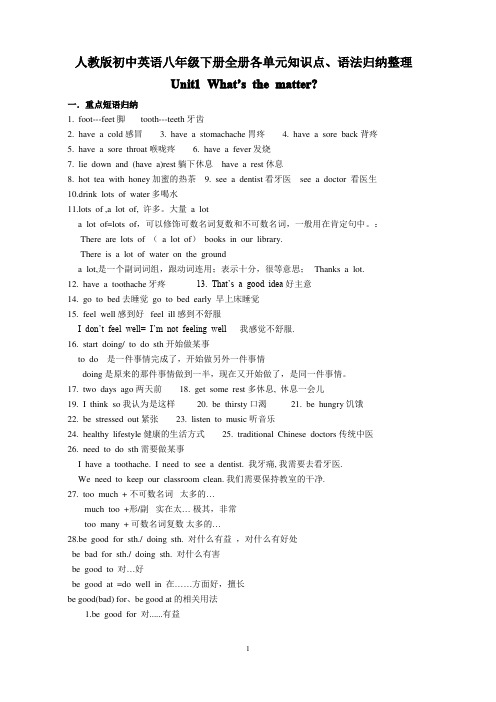
人教版初中英语八年级下册全册各单元知识点、语法归纳整理Unit1W hat’s the matter?一.重点短语归纳1.foot---feet脚tooth---teeth牙齿2.have a cold感冒3.have a stomachache胃疼4.have a sore back背疼5.have a sore throat喉咙疼6.have a fever发烧7.lie down and(have a)rest躺下休息have a rest休息8.hot tea with honey加蜜的热茶9.see a dentist看牙医see a doctor看医生10.drink lots of water多喝水11.lots of ,a lot of,许多。
大量a lota lot of=lots of,可以修饰可数名词复数和不可数名词,一般用在肯定句中。
:There are lots of(a lot of)books in our library.There is a lot of water on the grounda lot,是一个副词词组,跟动词连用;表示十分,很等意思;Thanks a lot.12.have a toothache牙疼13.That’s a good idea好主意14.go to bed去睡觉go to bed early早上床睡觉15.feel well感到好 feel ill感到不舒服I don’t feel well=I’m not feeling well我感觉不舒服.16.start doing/to do sth开始做某事to do是一件事情完成了,开始做另外一件事情doing是原来的那件事情做到一半,现在又开始做了,是同一件事情。
17.two days ago两天前18.get some rest多休息,休息一会儿19.I think so我认为是这样20.be thirsty口渴21.be hungry饥饿22.be stressed out紧张23.listen to music听音乐24.healthy lifestyle健康的生活方式25.traditional Chinese doctors传统中医26.need to do sth需要做某事I have a toothache.I need to see a dentist.我牙痛,我需要去看牙医.We need to keep our classroom clean.我们需要保持教室的干净.27.too much+不可数名词太多的…much too+形/副实在太…极其,非常too many+可数名词复数太多的…28.be good for sth./doing sth.对什么有益,对什么有好处be bad for sth./doing sth.对什么有害be good to对…好be good at=do well in在……方面好,擅长be good(bad) for、be good at的相关用法1.be good for对......有益Doing morning exercises is good for your health.做早操对你们的建康有益。
人教版八年级下册英语各单元重点短语句型及语法

学习好资料欢迎下载人教八下重要短语、句子汇总Unit 1 What's the matter?一、重点短语1. have a fever 发烧23. make a decision 做出决定2. have a cough 咳嗽24. without thinking twice 没有多想3. have a toothache 牙疼25. get off 下车4. talk too much 说得太多26. have a heart problem 有心脏病5. drink enough water 喝足够的水27. to one's surprise 使....... 惊京讶的6. have a cold 受凉;感冒28. thanks to 多亏了;由于7. have a stomachache 胃疼29. in time 及时8. have a sore back 背疼30. save a life 挽救生命9. have a sore throat 喉咙痛31. get into trouble 造成麻烦10. lie down and rest 躺下来休息32. right away 立刻;马上11. so that 以便33. because of 由于12. see a dentist 看牙医34. get out of 离开;从……出萍13. get an X-ray 拍X 光片35. hurt oneself 受伤14. take one's temperature 量体温36. take risks 冒险15. give up 放弃37. fall down 摔倒16. keep on doing sth. 坚持做某事38. feel sick 感到恶心/感到不舒服17. sound like 听起来像39. have a nosebleed 流鼻血18. run out (of) 用完;用尽40. so. . . that 如此……以至于…19. in the same way 以同样的方式41. have problems breathing 呼吸困难20. be used to doing sth. 习惯做某事42. be in control of 掌管;管理21. go along 沿着……走二、重点句型1. What' s the matter with you? / What' s wrong with you?你怎么了?2. What should she do?她该怎么办呢?→主语+ should/shouldn't + 动词原形. ..①You should lie down and rest.你应该躺下休息一会儿。
人教版八年级英语下册各单元知识点汇总
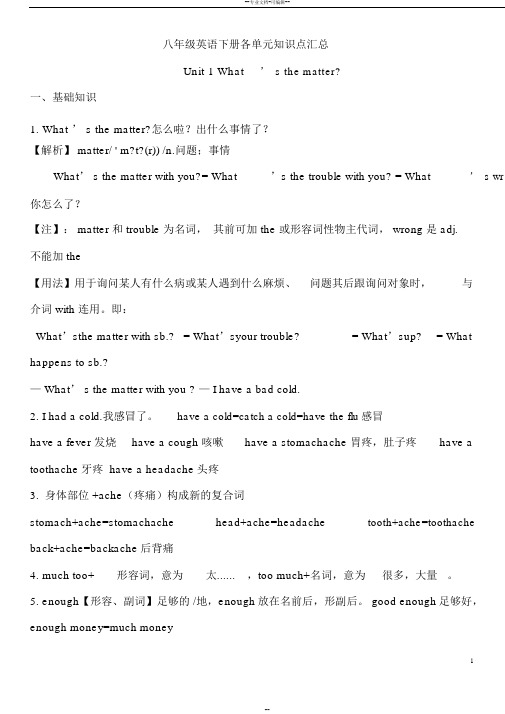
--专业文档-可编辑--八年级英语下册各单元知识点汇总Unit 1 What’ s the matter?一、基础知识1.What ’ s the matter?怎么啦?出什么事情了?【解析】 matter/ ' m?t?(r)) /n.问题;事情What’ s the matter with you?= What’s the trouble with you? = What’ s wr 你怎么了?【注】: matter 和 trouble 为名词,其前可加 the 或形容词性物主代词, wrong 是 adj.不能加 the【用法】用于询问某人有什么病或某人遇到什么麻烦、问题其后跟询问对象时,与介词 with 连用。
即:What’sthe matter with sb.? = What’syour trouble?= What’sup? = What happens to sb.?— What’ s the matter with you ? — I have a bad cold.2. I had a cold.我感冒了。
have a cold=catch a cold=have the flu感冒have a fever 发烧have a cough 咳嗽have a stomachache 胃疼,肚子疼have a toothache牙疼 have a headache头疼3.身体部位 +ache(疼痛)构成新的复合词stomach+ache=stomachache head+ache=headache tooth+ache=toothache back+ache=backache后背痛4. much too+形容词,意为太......,too much+名词,意为很多,大量。
5.enough【形容、副词】足够的 /地,enough放在名前后,形副后。
good enough足够好,enough money=much money6. lie down 躺下, lie 躺,躺着,过去式lay;lie 说谎,过去式 lied7. maybe 或―许‖,常用于句首,表示可能性,后加句子。
人教版八年级英语下册各单元语法点汇总

Unit 1 What’s the matter?一、询问某人的健康问运及遭到麻烦的表达方法(1)询问某人患了何种疾病或遇到了何种麻烦时,常用以下几种结构来表达:What’s the matter (with sb.)?(某人)怎么了?What’s wrong (with sb.)?(某人)怎么了?What’s the trouble (with sb.)?(某人)出什么事了?What happened (to sb.)?(某人)发生了什么事?Are you OK?你没事吧?Is there anything wrong with sb.?某人有什么事吗?(2)要表达身体疼痛或不舒服,可用以下结构:①某人+have/has+病症.The twins have colds.双胞胎感冒了。
某人+have/has+a+headache/toothache/stomachache/backache/earache.She had a stomachache last night.她昨晚肚子痛。
③某人+have/has+a+sore+发病部位. He has a sore throat.他喉咙痛。
④某人+hurt(s)+身体部位或反身代词. He hurt his leg.他的腿受伤了。
⑤某部位+hurt(s).My head hurts badly.我头痛得厉害。
⑥某人+have/has+a pain+in one’s+身体部位, I have a pain in my chest.我胸口痛。
⑦(There is)something wrong with one’s+身体部位.There is something wrong with my right eye..我的右眼有毛病。
⑧其他表达方式She has a heart trouble.她有心脏病。
He got hit on the head他头部受到了撞击。
人教版八年级英语下册各单元知识点汇总

八年级英语下册各单元知识点汇总Unit 1 What’s the matter?一、基础知识1. What’ s the matter? 怎么啦?出什么事情了?【解析】matter/ ' mætə(r)) /n.问题;事情What’ s the matter with you?= What’s the trouble with you? = What’ s wrong with you? 你怎么了?【注】:matter 和trouble 为名词,其前可加the 或形容词性物主代词,wrong 是adj. 不能加the【用法】用于询问某人有什么病或某人遇到什么麻烦、问题其后跟询问对象时,与介词with连用。
即:What’s the matter with sb.? = What’s your trouble? = What’s up? = What happens to sb.?—What’s the matter with you ?— I have a bad cold.2. I had a cold.我感冒了。
have a cold=catch a cold=have the flu感冒have a fever 发烧have a cough咳嗽have a stomachache胃疼,肚子疼have a toothache牙疼have a headache头疼3. 身体部位+ache(疼痛)构成新的复合词stomach+ache=stomachache head+ache=headache tooth+ache=toothache back+ache=backache后背痛4. much too+ 形容词,意为太...... ,too much+名词,意为很多,大量。
5. enough【形容、副词】足够的/地,enough放在名前后,形副后。
good enough足够好,enough money=much money6. lie down躺下,lie 躺,躺着,过去式lay;lie说谎,过去式lied7. maybe “或许”,常用于句首,表示可能性,后加句子。
- 1、下载文档前请自行甄别文档内容的完整性,平台不提供额外的编辑、内容补充、找答案等附加服务。
- 2、"仅部分预览"的文档,不可在线预览部分如存在完整性等问题,可反馈申请退款(可完整预览的文档不适用该条件!)。
- 3、如文档侵犯您的权益,请联系客服反馈,我们会尽快为您处理(人工客服工作时间:9:00-18:30)。
Unit 1 What’s the matter?一、询问某人的健康问运及遭到麻烦的表达方法(1)询问某人患了何种疾病或遇到了何种麻烦时,常用以下几种结构来表达:What’s the matter (with sb.)?(某人)怎么了?What’s wrong (with sb.)?(某人)怎么了?What’s the trouble (with sb.)?(某人)出什么事了?What happened (to sb.)?(某人)发生了什么事?Are you OK?你没事吧?Is there anything wrong with sb.?某人有什么事吗?(2)要表达身体疼痛或不舒服,可用以下结构:①某人+have/has+病症.The twins have colds.双胞胎感冒了。
某人+have/has+a+headache/toothache/stomachache/backache/earache.She had a stomachache last night.她昨晚肚子痛。
③某人+have/has+a+sore+发病部位. He has a sore throat.他喉咙痛。
④某人+hurt(s)+身体部位或反身代词. He hurt his leg.他的腿受伤了。
⑤某部位+hurt(s).My head hurts badly.我头痛得厉害。
⑥某人+have/has+a pain+in one’s+身体部位, I have a pain in my chest.我胸口痛。
⑦(There is)something wrong with one’s+身体部位.There is something wrong with my right eye..我的右眼有毛病。
⑧其他表达方式She has a heart trouble.她有心脏病。
He got hit on the head他头部受到了撞击。
She cut her finger.她割破手指了。
二情态动词should的用法1.Should为情态动词,意为“应该;应当”,否定式为shouldn’t,其后接动词原形,无人称和数的变化。
常用来表示征询意见、建议、劝告、要求或义务等。
You should drink hot water with honey.你应该喝加有蜂蜜的开水。
He should put his head back他应该把头后仰。
We should try our best to help him.我们应当尽力去帮助他。
You shouldn‘t watch TV.你不应该看电视。
2.Should用于主语为第一人称的疑问句,表示征询意见。
Should I put some medicine on it?我应当给它敷上药吗? Should we tell her about it?我们应该告诉她这件事吗?【拓展】在英语中,表示建议的说法有很多,而且都是中考考查的重点。
主要结构有:①Would you like (to do) sth.?你想要/愿意(做)某事吗?Would you like to play basketball with me?你想要和我一起打篮球吗?②Shall I/we do sth ?我/我们做……好吗?Shall we go to the zoo tomorrow?明天我们去动物园,好吗?③Why not do sth ?为什么不……呢?Why not join us?为什么不加入到我们当中来呢?④How/What about doing sth ?做某事怎么样? How about going swimming?去游泳怎么样?⑤Let’s do sth让我们做……吧。
Let’s go home.咱们回家吧。
⑥You’d better (not) do sth你最好(不)要做某事。
You’d better not go there alone.你最好不要一个人去那儿。
Unit 2 I'll help clean up the city parks动词不定式A. 作主语——为避免句子的头重脚轻,常用it作为形式主语,而真正的主语动词不定式后置。
常用句型:It +be+adj./n.+(for/of sb.) to do sth./It takes sb. some time to do sth.B. 作宾语——动词want, decide, hope, ask, agree, choose, learn, plan, need, teach, prepare…常接动词不定式作宾语。
C. 作(后置)定语——常用于“have/has+sth.+to do”或“enough+名+to do”“It’s time to do sth.”等结构中。
D. 作宾语补足语——tell, ask, want, invite, teach, like, call等可接带to的动词不定式作宾语补足语,构成tell/ask/want /call/invite sb. to do sth.结构。
【注意】动词不定式作使役动词和感官动词的宾语补足语时应省去to:“一感(feel),二听(listen to, hear),三让(let, make, have,,四看(look at, see, watch, notice),半帮助(help)”。
E. 动词不定式作状语主要用来修饰动词,表示目的,结果或原因。
为了强调目的,有时可以把动词不定式放在句首,或在不定式前加in order (to) 或so as (to) “为了,目的是”。
常用结构有too + adj./adv. + to do sth.等。
F. 固定句式中动词不定式的用法常见的形式有:had better (not) do sth./Would you like to do sth.?/Why not do sth.?/Would you please (not) do sth.?等。
Unit 3 Could you please clean your roomCould you please...?句型(1)请求别人时通常用此句型,也可以说:Can you...please?情态动词could或can在这里均表示请求,在意思上无区别,但是用could在于其上显得更委婉、客气、诚恳。
在日常生活中常使用could you/I...?若在句末加上please,则显得更礼貌。
Could you help me find my book,please?你能帮我找到我的书吗?(2)对could you/I...?的问句作出肯定回答,常用“sure/certainly/of course”等;如果作否定回答,常用“sorry或oh,please don’t”。
一般不用no开头,用no显得语气生硬、不礼貌。
(3)表示请求的句式:Would you like to do...? Would you mind doing...? Let’s do.... Shall I/we do...?Please do...(祈使句前加please)提示:could you please...与could I Please...两种问句,前者是请求别人帮忙的句式,后者是有礼貌地向别人请求允许的交际用语。
试比较:Could you please help me?请你帮我一下好吗?Could I please invite my friends to my birthday party,Mom? 妈妈,我能邀请我的朋友参加我的生日聚会吗?Unit 4 Why don't you talk to your parents?1.提建议向别人发出邀请,请求,建议,或征求某人的意见的其他表达方式:How /what about doing sth.?(about是个介词,可跟名词或动名词)“…怎么样?”You’d better (not) do something.“你最好(不)做某事”Would you like sth …?:“你想要某物Let‟s do sth…?What should I do …? ( should表示请求、征询对方意见)2.学会谈论问题和学会用why don't you…提建议向别人发出邀请,请求,建议,或征求某人的意见的表达方式:Why don‟t you do something? =Why not do something? 你为什么不做某事呢?来表示请求、征询对方意见3.until, so that ,although引导的状语从句:1)until:在带有till或until引导的时间状语从句里,如果主句用肯定式,其含义是“一直到……时”,谓语动词只能用延续性动词。
如果主句用否定式,其含义是“直到……才……”, “在……以前不……”, 谓语动词可用瞬间动词。
Don‟t get off until the bus stops.2)so that引导目的状语从句(为了,以便)例如:He studies hard so that he could work better in the future3)although的用法意思相当于though(尽管,虽然),引导让步状语从句。
引导的从句不能与并列连词but,and, so 等连用,但可以和yet, still等词连用。
例如:Although he was tired, he went on working.尽管他很累,但是他继续工作。
Unit 5 What were you doing when the rainstorm came?过去进行时1. 基本概念:过去进行时表示在过去某一时刻或一段时间内正在进行的动作。
这一特定的过去时间除有上下文暗示以外, 一般用时间状语来表示。
2. 结构 was / were ( not ) + 动词-ing3. 句式肯定式:I/He/She/It was working. We/You/They/ were working.否定式:I/He/She/It was not working.We/You/They/ were not working.疑问式和简略回答:Was I working? Yes, you were. No, you were not. Were you working? Yes, I was. No, I was not. Was he/she/it working? Yes , he/she/it was. No, he/she/it was not. Were we/you/they working? Yes, you/we/they were. No, you/we/they were not. 注:1) was not常缩略为wasn’t; were not常缩略为weren’t。
